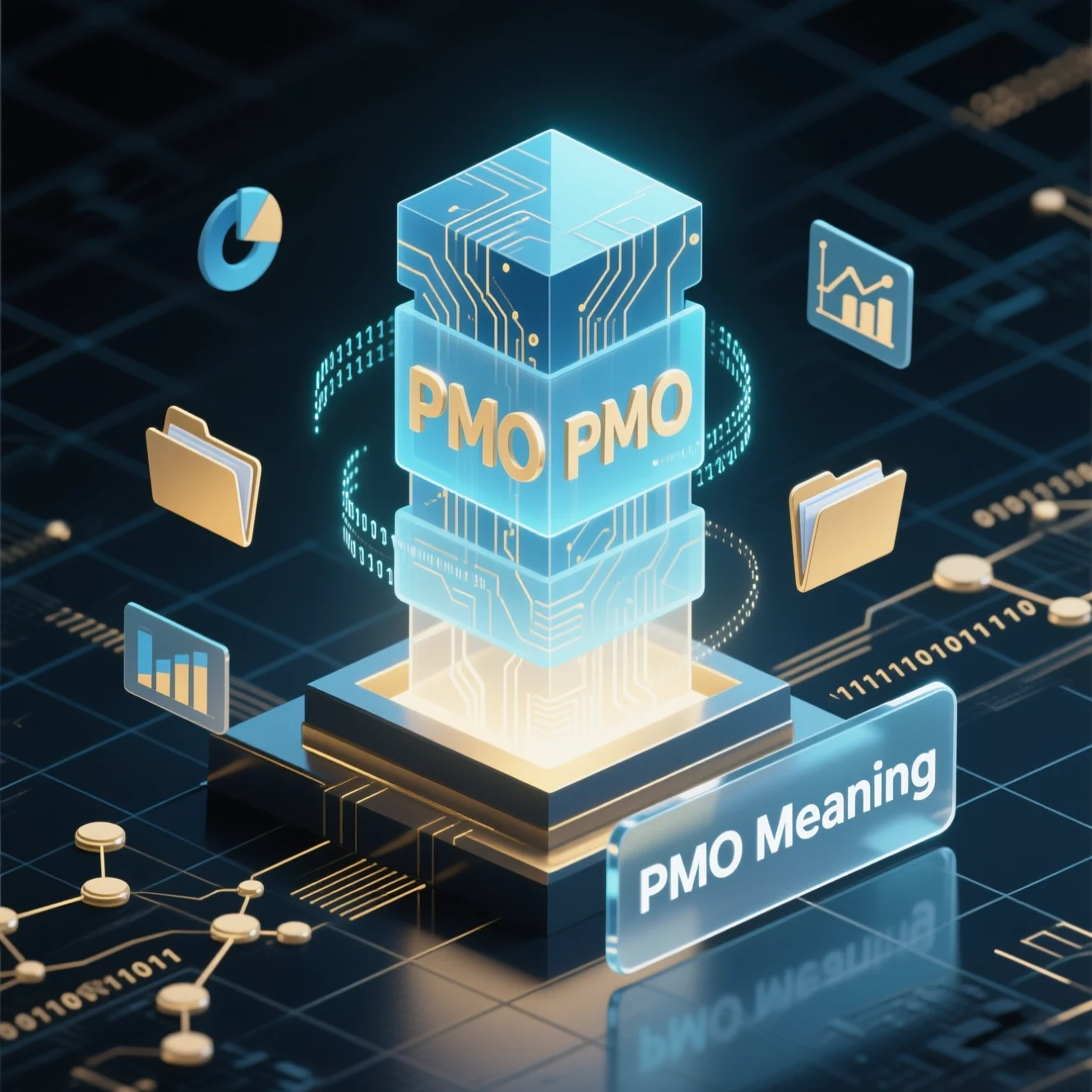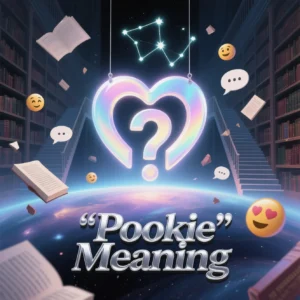In today’s fast-paced world, acronyms like PMO pop up everywhere—work emails, project meetings, social media, and even casual chats. But what does PMO mean, and why should you care? PMO stands for Project Management Office in professional settings, a term tied to organizing projects and boosting efficiency.
In informal contexts, especially online, it can mean “Put Me On”, a slang phrase used to ask for an introduction or recommendation. Understanding PMO is key because it bridges workplace efficiency and modern slang, helping you navigate conversations confidently.
Whether you’re a project manager streamlining tasks or a gamer asking to be “put on” to a new trend, knowing PMO’s meaning ensures you’re in the loop. This blog breaks down PMO’s meanings, origins, and uses to keep you informed and ready for any context.
Definition & Meaning
PMO has two primary meanings depending on the context:
- Project Management Office (PMO): In business, a PMO is a department or group that oversees project management within an organization. It sets standards, manages resources, and ensures projects align with company goals. Think of it as the “control tower” for projects, keeping everything on track.Example: A company launches a new product. The PMO ensures the marketing, design, and production teams work together smoothly, meeting deadlines and budgets.
- Put Me On (PMO): In slang, PMO means asking someone to introduce or recommend you to something or someone. It’s common in social media, gaming, or casual chats, often tied to discovering new music, trends, or connections.Example Dialogue:
- Friend: “Yo, that new rapper’s fire!”
- You: “PMO! Send me their tracks.”
The meaning hinges on context—workplace or casual. Using PMO correctly avoids confusion and keeps communication clear.
Background & History
The Project Management Office concept emerged in the 1990s as businesses grew complex, needing structured project oversight. Early PMOs focused on standardizing processes in industries like construction and IT. Over time, PMOs evolved into strategic hubs, aligning projects with corporate goals. Today, they’re common in large organizations, with 85% of Fortune 500 companies having a PMO, according to PMI (Project Management Institute).
The slang “Put Me On” has roots in African American Vernacular English (AAVE), gaining traction in the 2000s through hip-hop culture. It originally meant asking for a favor, like getting introduced to a job or person. Social media platforms like Twitter and Instagram amplified its use, especially among Gen Z, to mean sharing recommendations for music, fashion, or trends. Both meanings of PMO reflect a desire for connection—whether to a project’s success or a cultural vibe.
Usage in Various Contexts
PMO’s dual meanings shine in different settings:
- Workplace (Project Management Office): PMOs are vital in corporate environments, ensuring projects stay on budget and schedule.
Example Dialogue:- Manager: “The PMO flagged a delay in our software rollout.”
- Team Lead: “Let’s meet with them to adjust the timeline.”
- Texting/Social Media (Put Me On): PMO is a quick way to ask for recommendations or introductions online.
Example Dialogue:- User1: “Just found this dope sneaker brand!”
- User2: “PMO, what’s the name?”
- Gaming: Gamers use PMO to ask for tips, game invites, or new content.
Example Dialogue:- Player: “This new map is wild!”
- Friend: “PMO! How do I unlock it?”
The tone and platform dictate PMO’s meaning, so context is everything.
Common Misconceptions & Clarifications
A common mix-up is assuming PMO only means Project Management Office. In casual settings, this can lead to confusion if someone interprets it as Put Me On. For example, saying “I need the PMO’s input” in a gaming chat might puzzle friends expecting slang.
Another misconception is that Put Me On is always about music or trends. It can also mean connecting someone to a person or opportunity, like a job. However, PMO as slang isn’t offensive but can seem pushy if overused.
Clarification: Always consider the audience. In professional emails, spell out “Project Management Office” to avoid ambiguity. In casual chats, PMO as slang is fine but clarify if the context is unclear to prevent misunderstandings.
Similar Terms & Alternatives
PMO shares space with related terms:
- Workplace Alternatives:
- PMP: Project Management Professional, a certification.
- PM: Project Manager, an individual role.
- EPMO: Enterprise Project Management Office, a broader PMO.
- Slang Alternatives:
- Hook Me Up: Similar to “Put Me On,” asking for a connection.
- Show Me: Requests information or recommendations.
- Link Me: Asks for a direct link to content.
| Term | Context | Meaning |
|---|---|---|
| PMO (Workplace) | Professional | Project Management Office |
| PMO (Slang) | Casual/Social Media | Put Me On (recommend or introduce) |
| Hook Me Up | Casual | Connect me to something/someone |
| PMP | Professional | Project Management Professional |
How to Respond to This Term
Responses to PMO depend on the vibe:
- Casual: Keep it light and friendly.
Example:- Friend: “PMO with some new music!”
- You: “Bet, check out this playlist!”
- Funny: Add humor to stand out.
Example:- Friend: “PMO with that game cheat code!”
- You: “Lol, I’ll PMO when I stop dying in level one!”
- Professional (PMO as Project Management Office): Stay formal and clear.
Example:- Colleague: “Can you loop in the PMO?”
- You: “I’ll schedule a meeting with the Project Management Office tomorrow.”
- Privacy-Conscious: Politely decline sharing.
Example:- User: “PMO with your contact list!”
- You: “Haha, my list’s top secret, but I’ll share some public resources.”
Tailor your tone to match the context and relationship.
Regional or Cultural Differences
Project Management Office is a universal term in English-speaking corporate cultures, especially in the U.S., U.K., and Australia. It’s less common in non-English-speaking countries unless translated (e.g., “Oficina de Gestión de Proyectos” in Spanish).
Put Me On is heavily tied to U.S. urban slang and AAVE, spreading globally through music and social media. In the U.K., similar slang like “sort me out” is more common. In Australia, “hook me up” might dominate. Non-English cultures may not use PMO as slang due to language barriers, but equivalents exist, like “recomiéndame” (recommend me) in Spanish-speaking communities.
Cultural nuance matters—PMO as slang can feel too informal in conservative settings, so gauge the audience.
Comparison with Similar Terms
| Term | Meaning | Context | Tone |
|---|---|---|---|
| PMO (Slang) | Put Me On (recommend/introduce) | Casual/Social Media | Informal |
| Hook Me Up | Connect me to something/someone | Casual | Informal |
| Link Me | Share a direct link or resource | Social Media/Gaming | Informal |
| Show Me | Show or explain something | Casual | Neutral |
| PMO (Workplace) | Project Management Office | Professional | Formal |
Key Difference: PMO’s dual meanings (formal vs. slang) make it unique. Slang alternatives like “Hook Me Up” are purely casual, while workplace terms like PMP are strictly professional.
Usage in Online Communities & Dating Apps
On platforms like Twitter, PMO (Put Me On) is common for sharing trends or music. Users might tweet, “PMO with some anime recs!” to crowdsource suggestions. On Tinder, it’s used playfully to ask for introductions or date ideas.
Example:
- User: “PMO with a cool coffee spot for our date!”
- Match: “Got you! Try Brew & Bean downtown.”
In gaming communities (e.g., Discord), PMO often means asking for game invites or tips.
Tip: Respond promptly and match the platform’s tone—casual on Tinder, enthusiastic in gaming chats. Avoid using PMO as slang in professional DMs on LinkedIn to prevent misinterpretation.
Hidden or Offensive Meanings
PMO doesn’t typically carry offensive meanings, but context matters. Professional settings, using PMO as slang (“Put Me On”) could seem unprofessional or confusing. In casual settings, overusing PMO might come off as demanding, like begging for favors.
In rare cases, PMO could be misread as an obscure acronym with negative connotations (e.g., an unrelated abbreviation in niche communities). Always clarify the intent. Tone matters: A playful “PMO!” is fine among friends but could annoy strangers if it feels pushy.
Suitability for Professional Communication
PMO as Project Management Office is perfectly suited for formal settings like emails, reports, or meetings. Always spell it out initially (“Project Management Office (PMO)”) for clarity.
Example: “The Project Management Office (PMO) will review the timeline.”
PMO as slang is inappropriate for professional communication. It risks confusion or appearing too casual. Instead, use clear phrases like “recommend” or “introduce.”
Professional Alternative:
- Instead of “PMO with a vendor,” say, “Please recommend a vendor.”
Stick to formal language in workplaces to maintain professionalism.
FAQs
- What does PMO stand for?
PMO means Project Management Office in business or Put Me On in slang, depending on context. - Is PMO slang appropriate for work?
No, use “Project Management Office” in professional settings and avoid the slang version. - Where did “Put Me On” come from?
It originated in African American Vernacular English, popularized through hip-hop and social media. - Can PMO be offensive?
It’s not typically offensive but can seem pushy or unprofessional if misused. - How do I respond to “PMO” in a chat?
Share the requested info casually, like “Here’s the link!” or politely decline if uncomfortable. - Is PMO used globally?
The workplace term is global; the slang is mostly U.S.-centric but spreading via social media.
Conclusion
PMO is a versatile acronym with two distinct lives: Project Management Office, a cornerstone of organized business, and Put Me On, a lively slang for seeking recommendations. Knowing when to use each meaning keeps you sharp in boardrooms and group chats alike. From managing multimillion-dollar projects to discovering the latest music, PMO connects people and ideas. Context is key—use it professionally for workplace clarity or casually to vibe with friends. By understanding its origins, uses, and nuances, you can wield PMO confidently, avoiding mix-ups and embracing its dual charm. Stay in the know, and let PMO guide you in both work and play!



